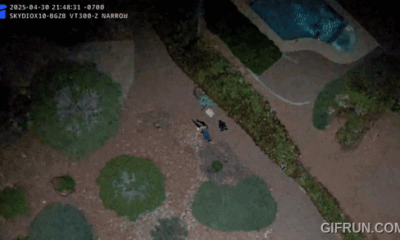County News
HHS Secretary Becerra Delivers Key Health Insights in Cottonwood

U.S. Secretary of Health and Human Services Xavier Becerra led a town hall meeting at the Cottonwood Recreation Center on Wednesday, August 7. This event attracted roughly 100 local residents eager to engage on pertinent health issues.
The forum was facilitated by U.S. Department of Agriculture Rural Development State Director Charlene Fernandez and featured contributions from San Carlos Apache Tribe Department of Health and Human Services Executive Director David Reede, Steps to Recovery Executive Director Damien Browning, and Northland Cares Executive Director Johnny Martinez.
During the meeting, Becerra highlighted a significant upcoming announcement following negotiations between the federal government and various pharmaceutical companies. He stated these negotiations marked a historic shift in how Medicare addresses drug pricing, indicating results would be revealed within weeks.
“We have never been able, under the Medicare program, to negotiate lower drug prices by law,” Becerra explained, underscoring the issue of high medication costs in the U.S. He noted that Americans often pay two to three times more than individuals in other countries for identical drugs, many of which are manufactured domestically.
Specifically addressing Medicare Part D, Becerra pointed out that this program, established in 2006, has limited the Centers for Medicare and Medicaid Services from negotiating prices for 50 million seniors. However, a change in federal policy has allowed for negotiations since March.
This current round of negotiations includes well-known drug names such as Eliquis, Xarelto, and Enbrel. Becerra announced that plans for next year aim to increase the number of price-negotiated drugs to 15, with expectations to rise to 20 by 2030.
He also informed attendees about a future cap on out-of-pocket costs for Medicare recipients, which will set a $2,000 limit per year starting in 2025.
In addition to drug pricing, Becerra emphasized the administration’s efforts to improve access to healthcare through telehealth services, especially during the COVID-19 pandemic. He expressed a desire to maintain the policies that eliminated geographic restrictions on telehealth appointments, which are set to expire at the end of this year.
Martinez highlighted the importance of telehealth for Northland Cares, noting that it has enabled the organization to serve approximately 25% of its 270 patients. The convenience of remote healthcare is especially beneficial for clients who face significant travel challenges.
Kent Ellsworth from the Verde Valley Caregivers Coalition raised concerns about the potential end of telehealth flexibility, emphasizing the organization’s role in transporting individuals to medical appointments. He mentioned that they facilitated rides to over 700 healthcare locations in the past year.
Becerra reiterated the need for Congressional support to extend these emergency flexibilities permanently. “We need Congress to change the law,” he insisted, stressing the importance of telehealth for rural Americans.
Browning, representing Steps to Recovery, shared how $3.2 million in loans from the USDA has substantially bolstered their facilities, highlighting recent improvements that directly benefit the community.
Additionally, Martinez explained how funding from HHS supports Northland Cares, which receives significant grants for its ongoing services. He emphasized the critical role these funds play in ensuring healthcare access for the community.
In closing, Becerra urged attendees to advocate for their needs by engaging with both their elected representatives and cabinet members. While the Secretary confirmed that meeting rural communities poses challenges, he reaffirmed its importance.
At the conclusion of the event, Becerra did not disclose any planned future visits by cabinet members to Yavapai County, leaving residents eager for continued engagement.


















